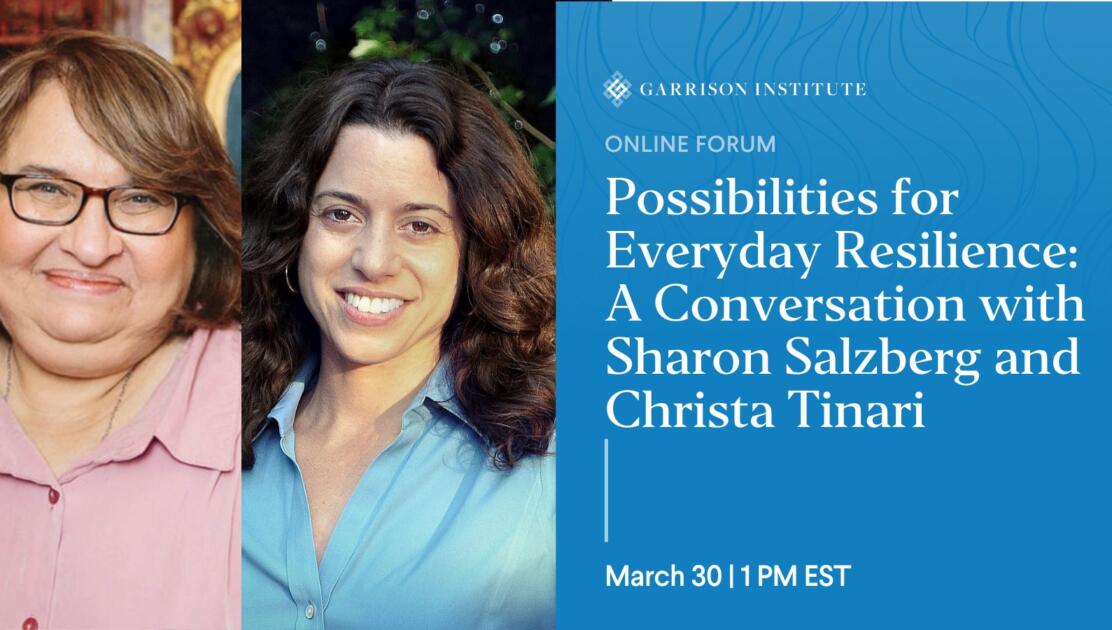Possibilities for Everyday Resilience: A Conversation with Sharon Salzberg
Renowned meditation teacher Sharon Salzberg joined Christa Tinari, The Garrison Institute’s Director of Contemplative-Based Resilience Project on March 30th for the inaugural CBR Project forum to discuss the possibilities that exist for everyday resilience. Salzberg’s forthcoming book, Real Life: The Journey from Isolation to Openness and Freedom will be released April 2023.
To start the conversation, Christa asked Sharon to shed light on the term “resilience.” Sharon noted that when considering the resilience of people in direct human service professions, we must recognize that they’re impacted by vicarious trauma, which can lead to burnout. Sharon asserted that “We need to understand the stress dynamic. There is the pressure and situation coming at us, and then there is the resource with which it’s met. The resource is both internal, such as inner strength, and it’s [external]- being in community rather than facing the difficulty alone.” These resources contribute to resilience.
Sharon continued, “The word resilience seems to imply going back- bouncing back to the precise place we were before some hardship. But that’s a little limited isn’t it? There are also lessons learned, new strengths developed, a new sense of community…so we’re going forward.” Drawing from the teaching of Elaine Miller-Karas’ of the Trauma Resource Institute, Christa offered the question “What else is true?” when we find ourselves in times of hardship. Christa added that this view of resilience aligns with the theory of “post-traumatic growth” which is the idea that people may experience positive growth after trauma, through developing new tools to handle stress, and deepening their sense of connection to self and others.
Christa and Sharon discussed the distinction between empathy and compassion, as Christa commented that empathic distress can result when we are overcome by someone else’s pain. Sharon noted that if we feel only empathy and not compassion, we may turn away from the pain of someone else’s suffering, due to the discomfort it brings or simply because we don’t have the energy to act. Sharon defined compassion as “a trembling or quivering of the heart in response to seeing pain or suffering. And it’s a movement towards others to see if we can be of help. It’s not a movement into the experience of others, and it’s not a movement to seize control and be the savior.” She noted there is also the need for balance: balance between compassion for yourself and for others, and a realistic understanding of what you can change and what you can not.
Sharon also spoke about the benefits of bringing awareness to our difficult emotions and thoughts: “When we struggle against our difficult feelings they get stronger.” She advised that we can gain more freedom through nonjudgmental awareness and compassion towards ourselves, rather than by blaming ourselves for having a natural human experience. Mindfulness, then, can be understood as cultivating a different relationship with our feelings and thoughts’- allowing them to just pass through us like weather.
After additional conversation about the important role of gratitude in building everyday resilience and what it means to provide a “ministry of presence”, Sharon led a lovingkindness meditation. Sharon assured listeners that if one is interested in developing a meditation practice, it’s not necessary to meditate for hours each day. She recounted a study by neuroscientist Amishi Jha who claimed that 12 minutes a day of formal meditation (sitting or walking) can make a difference. Sharon concluded, “that’s very reassuring.”
This online event was the first of a continuing series in the Garrison Institute’s Forum on Contemplative-Based Resilience (CBR) Project. The CBR Project is designed to help those who serve others to “be well to serve well.” In future forums, we’ll explore themes related to resiliency, trauma and well-being, compassion, contemplative practices, healing and connection.
